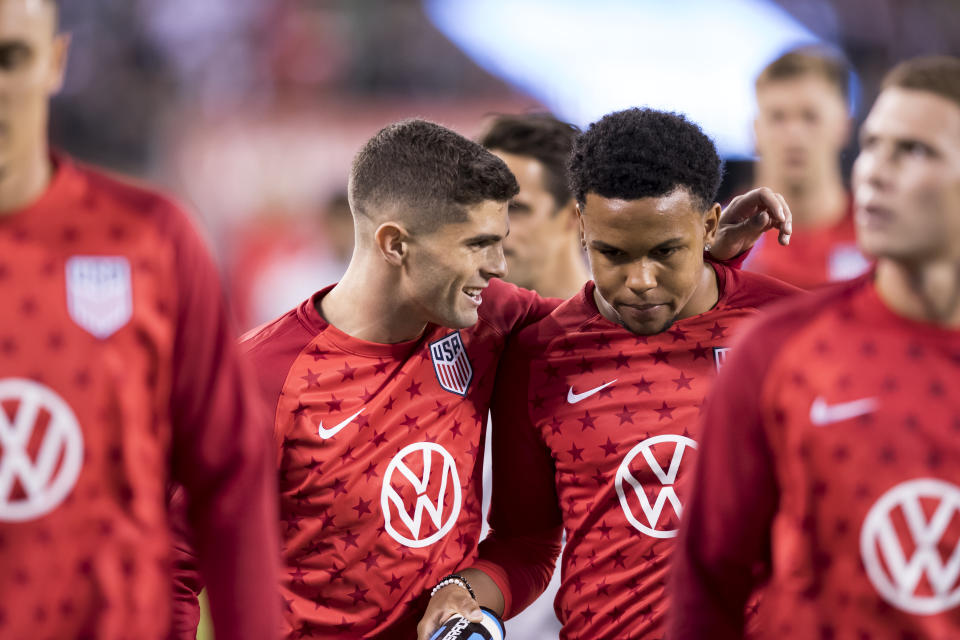Politics are once again paralleling the USMNT — and unlike four years ago, the outlook is much brighter
It seems fitting that the first match a full-strength United States men’s national team will play in almost a year comes days after Joe Biden was projected to win the presidency.
Just as the arrival of a new administration offers a fresh start for the country after four years of non-stop chaos under Donald Trump, Thursday’s friendly at Wales (and another next week against Panama in Austria) also represents a new beginning for the USMNT.
It’s purely a coincidence, of course, that the bleakest four-year stretch in recent national team history lines up almost exactly with what many Americans see as a similarly dark period for the republic under Trump, one in which norm after norm was shattered and the USA’s stature on the global stage plummeted.
The USMNT’s epic failure to qualify for the 2018 World Cup began just two days after Trump defeated Hillary Clinton in 2016. The U.S team was in camp in Ohio last Election Day as it prepared to meet Mexico to open the final round of qualifying. The Americans had beaten El Tri four consecutive times in Columbus, all by the famous 2-0 “dos a cero” scoreline.
Following Trump’s victory, the match suddenly became about a lot more than just soccer. Trump had kicked off his campaign by calling Mexican immigrants rapists, and promised that as president he would build a wall — that Mexico would pay for — to keep them out. Usually enemies on the soccer field, the 22 U.S. and Mexican starters posed together in solidarity, arms draped over each other’s shoulders, for a pregame picture.
The message wasn’t lost on anyone.

The U.S. went on to lose its first World Cup qualifier on home soil in more than 15 years. The setback proved critical; eleven months later, the Americans missed out on Russia 2018 by a single point, ending a run of seven consecutive World Cup appearances.
Multiple sources close to the team insisted to Yahoo Sports any political differences among players on the roster — several spoke out passionately after Trump banned visitors from seven mostly Muslim-majority nations in early 2017 while another, defender Geoff Cameron, publicly backed the move — didn’t impact performances or dressing room harmony. The core of the team that reached the knockout stages of the 2010 and 2014 World Cups was aging and, with the notable exception of Christian Pulisic, the promising new generation poised to replace it had yet to arrive.
Still, it’s also impossible to ignore the divisive political backdrop that the last qualification cycle was set against. (Trump’s unpopularity outside the country even changed U.S. Soccer’s tactics when bidding for the 2026 World Cup, with Canada and Mexico drafted in as co-hosts to appeal to FIFA voters who may have refused to endorse an American-only event.) The polarization of the U.S. citizenry has only increased since then.
Along the way, though, new leaders within the national team have emerged. Juventus midfielder Weston McKennie, a native Texan who captained the squad during last year’s Gold Cup final, hasn’t been shy about criticizing Trump’s performance in office. Fellow starters Tyler Adams, Reggie Cannon and Zack Steffen have also spoken out against social injustice and systemic racism.
After the killing George Floyd last spring, Pulisic, 17-year-old phenom Giovanni Reyna and just about every other USMNT player appeared in the “Enough is Enough” viral video McKennie created. English Premier League veteran DeAndre Yedlin suggested that in the absence of meaningful change, he might not don U.S. colors again. Several members of the new guard became eligible to vote for the first time in this election, and cast their ballots despite being employed by club teams scattered across Europe.
“When we talk about not being happy with the status quo,” coach Gregg Berhalter said last week when asked about his players participation in the 2020 race, “the next thing is to actually do something about it.”

The events of the last few months, and of the last four years, have forced this red, white and blue-chip group of youngsters to mature quickly, to have the sorts of uncomfortable conversations with each other that their predecessors never had to. They’re prepared for their moment in history, on and off the field.
“The internal discussions have been great within the team of supporting each other, sharing each other’s beliefs, and just educating each other on how people perceive certain situations and what their opinions are on it,” midfielder Tyler Adams told reporters Monday on a conference call, adding that he and his teammates are planning some sort of collective statement before Thursday’s contest in Swansea. “Those open, difficult discussions have been really helpful for the team.” (A U.S. Soccer source confirmed that the Welsh and American national anthems will be played before kickoff.)
Elections don’t immediately transform nations. It would be naive to think, after more than 70 million Americans voted for a second Trump term, that the incumbent had no support inside Berhalter’s dressing room. Whatever any player or staff member’s personal politics, though, the end of the Trump era will hopefully lower the temperature for everyone and bring about a kinder, gentler future.
It’s a new time. Perhaps the most diverse U.S. team ever assembled has convened in Wales ahead of the two exhibitions. Half of the 24-man squad is Black. Its average age is under 22 years old. They are the sons of immigrants and military members.
This is the retooled and exciting young U.S. side that fans have been waiting to see since before the coronavirus pandemic hit in March, the one that they hope will restore some of the respect the U.S. squandered during the last World Cup cycle.
That it will finally debut at the very moment a new era is dawning in America at large only adds to the intrigue.
More from Yahoo Sports:


